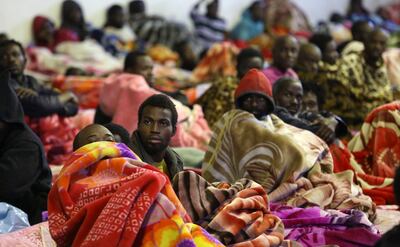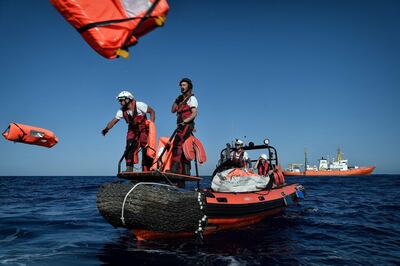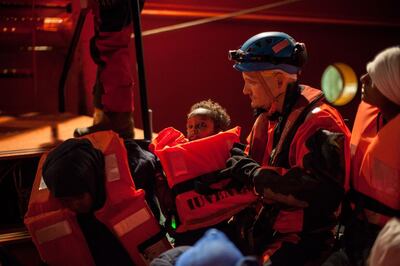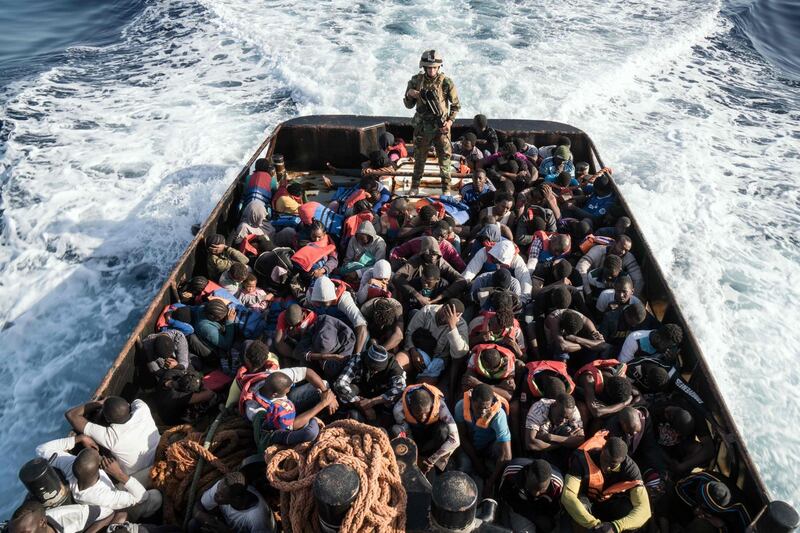Hundreds of migrants stranded on a NGO-run rescue vessel in the Mediterranean will be taken to Spain with the help of two Italian ships.
The 629 migrants, who boarded in Libya and include pregnant women and scores of children, have been at the heart of a huge row between Malta and Italy since their maritime rescue by French charity SOS Mediterranee on Saturday.
Spain on Monday offered to allow the Aquarius rescue vessel to dock in the eastern port city of Valencia, saying it had an "obligation" to do so. Deteriorating weather conditions and severe overcrowding on the vessel led Italian rescuers on Tuesday to offer to help transfer the migrants to Spain.
But as of Tuesday afternoon Aquarius remained in international waters off Malta and Italy, the countries with the closest ports of safety but which continue to refuse permission to dock.
In a statement on Tuesday French NGO Doctors Without Borders (MSF) urged members of the European Union to facilitate the immediate disembarkation of all 629 people, including 123 unaccompanied minors, 11 children and six pregnant women.
“Disembarkation cannot be delayed further,” said Dr David Beversluis, MSF’s doctor on board the Aquarius. "The medical situation on board remains stable for now but people are exhausted and stressed.”
_________
Read more:
UN slaps sanctions on people smugglers in Libya
More than 100 feared dead near Tunisia in Mediterranean crossing attempt
__________
Some patients were resuscitated and are being closely monitored onboard, as they are likely to develop pulmonary issues as a result of water aspiration. Twenty one patients suffered severe chemical burns after being exposed to a toxic mixture of sea water and fuel for an extended period of time. These patients are stable but will need ongoing wound care and dressing changes over the coming weeks, said MSF.
MSF/SOS Med ship #Aquarius has a 4 day route to #Spain with Italian coast guard and navy ships after #Italy and #Malta refused and #Tunisia was ignored. 629 #migrants aboard were picked up in inflatable boats off #Libya. https://t.co/9Ig6c3zXxd pic.twitter.com/Rrh6jqSsZH
— James Wheeler (@wheelertweets) June 12, 2018
Human rights activist Selam Tesfai has heard countless similar accounts of migrants and refugees who have take perilous paths to Italy. The worst stories, she says, are always the ones of Africans travelling through Libya.
One migrant told Ms Tesfai he reached Libya only to be abducted and taken to the home of a wealthy local family. There, he was enslaved and treated inhumanely. The family's children, recounted the man, had access to firearms and took morbid joy in firing rounds close to his feet. His death would have had few consequences - he would have simply been forgotten.
In January 2017 he reached Italy - others were not as fortunate.

Some have been shot by traffickers in a largely lawless Libya, while many more have drowned crossing the Mediterranean sea. Last year more than 3,100 people died at sea trying to reach Europe.
More than 1.8 million have entered Europe since 2014, with more than 600,000 arriving in Italy alone.
Because of its geographic location, the Italian peninsula has turned into a prime point of entry for Africans fleeing their countries via Libya and for many others travelling westward from the Middle East.
In the first six months of 2017 Italy had more than 61,000 arrivals via the Mediterranean, compared to Spain's 4,161 and Greece's 7,443.
Following the election of a new populist, anti-migrant government in May migrants and refugees hoping for Italian goodwill are already facing a hostile reception.
In an act of defiance on Monday Italy's new, far-right interior minister Matteo Salvini closed the country's ports to refugees and migrants, saying the EU should step in.
The UN, EU and its biggest member state Germany called on Malta and Italy to immediately allow the boat to dock, describing the situation as "an urgent humanitarian imperative".
"The priority of both the Italian and Maltese authorities should be ensuring these people receive the care they need," European Commission spokesman Margaritis Schinas told reporters, calling for a "swift resolution".
But Mr Salvini refused to back down.
__________
Read more:
Berlusconi says 600,000 migrants are 'ready' to commit crime in Italy
Migrant flow continues to cross the Mediterranean
_________
Mr Salvini, who heads the far-right Northern League party, coalesced last month with the anti-establishment Five Star Movement in a government that could turn out to be vehemently anti-migrant.
“The good times for illegals is over — get ready to pack your bags,” said Mr Salvini.
But for most, the prospect of returning to Libya is terrifying.

"Keeping people out of Italy is one thing, but sending them back to inhumane conditions in Libya is quite another," an NGO official whose work focuses on Libya told The National on condition of anonymity. "The result is a wild west where migrants are kept in detention centers in horrific conditions or, as we saw with the CNN video last year, sold as chattel."
In 2017 the then Interior Minister Marco Minniti cut controversial deals with a number of key actors in Libya. The agreements, which included boosting cooperation with the Libyan coastguard and negotiations with tribes in southern Libya, led to a decrease in the influx of migrants and refugees. But Mr Minniti’s methods were quickly came under scrutiny.
His deals were officially cut with the leader of Libya’s UN-backed government, Fayez al-Sarraj, but soon reports emerged claiming that Italian money had found its way into the pockets of militias tasked with preventing migrants from crossing the Mediterranean.
While Italy's previous government's engagement with Libya caused setbacks, it also bore some benefits.
"While I certainly agree that Italy's short-term focus on migration has had a negative impact on West Libya's stability, this is not the whole story," Riccardo Fabiani, an Italian geopolitical analyst at the research consultancy Energy Aspects, told The National.
“Rome has also engaged with municipalities across Western Libya, established fruitful ties with Misrata and Zintan, shored up Sarraj at several critical times, encouraged Italian companies to do business in the country despite the current situation, tried to broker a sustainable truce in the Fezzan region," explained Mr Fabiani. "And more in general Italy has been one of the main and most genuine supporters of the UN’s attempts to broker a peace deal.”

Under the new coalition government, however, these development policies and bilateral relations are unlikely to receive the same level of attention.
“This is only one side of the story and I would argue that only in the past few months Italy’s focus in Libya has become narrower and destabilising,” said Mr Fabiani.
With the new government in place domestic issues are likely to have priority over Libya.
In their statement MSF also called on EU governments and institutions to step up and find shared solutions to support countries on the frontline, such as Italy, who are dealing with the burden of arrivals of refugees, asylum-seekers and migrants by sea.
"Personally, I think confusion will persist on Libya for several months unless the flow of migrants explodes to the upside," Jalel Harchaoui, a geopolitical scholar and frequent commentator on Libya, told The National. "So far, it seems that the arrangements Minniti instituted last year are kind of holding up more or less."
Late last year, CNN aired footage of a Libyan slave auction. The video caused furor throughout Europe with protests breaking out in major cities. In Milan, the activist Ms Tesfai said many of the migrants and refugees she works with had known about these auctions for years. They are in regular contact with their relatives and fellow countrymen in Libya.
“It’s more violent now, there’s no common rule and the daily changing of militias means safety is even less,” Ms Tesfai said.






